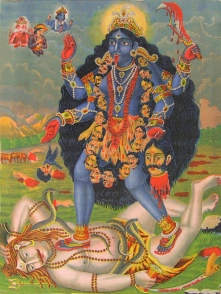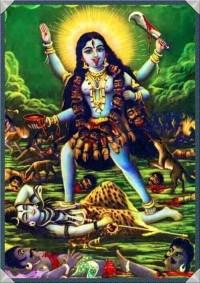This is a chapter from the book Stories of Mukunda by Swami Kriyananda. It describes an incident in the life of the young Paramhansa Yogananda, then known by his childhood name of Mukunda.
* * * * *
Mukunda’s heart danced in harmony with God’s creation. By day, as he walked around, he kept his mind firmly fixed at the point between the eyebrows, the seat of the divine or “single” eye.
By night, while others slept, he invoked the divine Presence. Sometimes his father, finding that he was meditating late at night, put food by the boy’s door. Mukunda would give the food to the family dog. Was not God, he reflected, his sufficient sustenance? He realized that his body needed but little care so long as he fed his soul on spiritual nectar.
Ananta, his elder brother, scoffed at him, “Your life will become like dry leaves, of use to no one.”
Mukunda smiled pleasantly. “Like dry leaves, perhaps, but not necessarily useless. Dry leaves, dear brother, make very good fertilizer!”
He worshiped God especially in the form of Mother, the all-compassionate aspect of the Divine. In Bengal the Divine Mother is commonly worshiped as Kali, a symbolic representation of God’s eternal call, and a challenge, to the soul. (“So long as you love your limited, human existence,” She seems to say, “you will have to go on dancing the rounds of life and death, of pleasure and pain, of joy and disappointment. For these are the unending rhythms of phenomenal existence. But love Me, the one, true Self of all beings, and I will grant you salvation in eternal bliss.”)
Whenever Mukunda found a sympathetic ear he would speak of the Divine Mother – of Her beauty, Her sweetness, Her power to banish the night of maya which veils the soul. His little friends would listen, enthralled. Inflamed by his divine devotion they, too, sought Kali’s love.
Out into the quiet woods the small group often went, or for strolls by the river Ganges, or for service to Kali among the poor. Sometimes they played children’s games, and laughed and sang; but in their romps they had an unseen Playmate, ever included in their fun: Kali. And then the wavelets danced along the riverbank; the fish slithered and splashed about with merriment; the leaves fluttered in frolic on the branches of the trees; the wind sang sportive measures through the meadow grass. All Nature played with them, who played with Kali.
One day Mukunda and his friends were walking home at sundown. Gray-clad shadows, night’s tender emissaries, crowded the western horizon. It was time for supper. Homes were fragrant with the odors of evening meals; gay sounds streamed out from open doors and windows. Mukunda and his companions smiled gently. Kali, their Mother, was dressing Bengal for night.
A young friend approached the group. His eyes were shining; he brought what he knew was good news.
“Mukunda,” he cried, “and all of you – listen! I’ve found a temple, one we haven’t seen before. My brother took me to it today. It’s a temple of Kali.”
“Kali! Kali!” cried Mukunda’s companions. “Let’s go tonight.” Kali, whether in image or reality, was the first love of their hearts. They looked expectantly at Mukunda. He, who had taught them the rapture of this love, would surely agree to lead this expedition.
But Mukunda’s mood was withdrawn. “You go,” he said. “I shall stay home tonight.”
“Stay home! But why?” His friends were nonplussed. Hadn’t he just sung to them of Kali in the fields? Hadn’t he just talked to them of Kali in the town? Now would he neglect Kali in the temple, and go home to bed? Their continued pleas failed to move Mukunda. Excusing himself with a quiet smile, he left the little group.
His friends went on to the temple without him. There they prostrated themselves in front of the image of Kali. They prayed and sang bhajans (devotional songs) before Her. Their hearts were lifted in the temporary inspiration that accompanies outward worship.
At home, Mukunda went to his room. He sat to worship Kali who resides in the temple of the soul. Of what use to him were stone images?
Mother Night, in whose cradle of sleep are lulled the gains and disappointments of the day, was singing softly to Bengal. Her voice could be heard in the wandering breezes; it whispered kind messages through the leaves of trees. Through the long day men had labored; now the night called to them caressingly: “Lay your burdens on my lap of peace.”
But sleep was far from Mukunda that night. With ever increasing yearning he called to the Divine Mother to come to him.
“Mother with lotus feet!” he cried. “Mother with hair spread like rays in blessing over creation, sweeping to nothingness men’s sorrows! Mother with light of laughter dancing in Your eyes! Mother, whose smiles twinkle in a myriad stars! Your child is calling You; Your little child longs for Your love. O Mother Divine, come to me! Tear asunder this veil of darkness which hides you from me!”
The room was tranquil with the stillness of his mind, with the fixity of his devotion. As clouds sometimes drifts in bright transparency around the moon, enhancing her loveliness, so a cloudlike peace stole over Mukunda’s soul; he knew his Divine Mother could not be far away.
Suddenly, as he chanted Her name, he beheld Her form! Fairer it was than moonbeams on a lotus after mid-summer dew. In Her eyes shone that love which creates the galaxies. In Her hair glistened countless stars, like diamonds. Over pathways of infinity She came to him, lightly, gracefully, dispelling from Mukunda’s enraptured gaze creation’s mood of darkness. His heart felt as though shattered into a million ecstatic fragments.
“Kali!” he whispered. “Mother Kali, You have come! Destroy forever Your child’s delusions! Keep him every near You! Oh, how beautiful You are! Mother, may my life be a constant song of love for You!”
The Divine Mother smiled, “Your prayer is granted, My child. Though you shall have to travel far, and bring many souls to My all-sheltering arms, in your heart of hearts you shall always remain in My formless presence. And when you call to Me, as often as you so desire it, in this form I will come to you.”









































So inspiring and written so beautifully
Jai Maa! My hair is standing on end!
I Jai Maa Jai Guru thanks for such a soul touching message of Maa Kali
Oh my divine mother
Lady of the universe mother to the immortal
Thank you so much for your love….